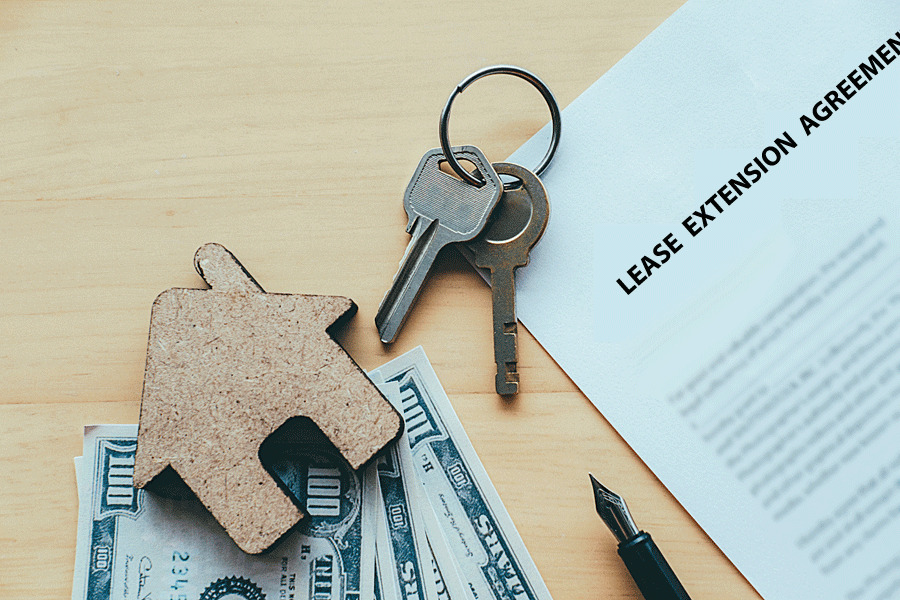A non-renewal lease letter is a formal acknowledgment that the landlord or tenant does not wish to renew their lease at a certain time. The landlord may want to free up the space for a new tenant or be tired of their current tenant, who is not following the rules or paying the rent on time. On the other hand, the tenant may need to move or want to choose a new place to live. In both cases, the lease non-renewal letter will help alert the other party and get things started on ending the agreement.
What is a Lease Non-Renewal Letter?
A non-renewal lease letter is simply a notification that a landlord can provide to their tenant, letting the tenant know that the lease will not be renewed.
Many landlords will agree to renew the lease with good tenants, but if a tenant did not follow the rent rules, delayed paying the rent, or is not a good tenant, a non-renewal lease letter may be the right solution.
A tenant can write a non-renewal lease letter as well. When the tenant writes the letter, they give the landlord notice that they do not intend to stay in the property once their original lease is over. This gives the landlord more time to look for a new tenant and fill the property. The tenant benefits by getting a good recommendation from the landlord for the courtesy, making it easier to move into a new apartment.
The not renewing lease letter is a simple document that will help both sides know what is going on. When the landlord writes the letter, the tenant will not be left wondering whether the lease will be renewed and will have time to move on.
Likewise, when the tenant writes the letter, the landlord has time to look for a new tenant and will not be caught by surprise when the tenant shares his decision to move out.
How Should the Letter be Sent?
Before sending the letter, there are a few items that you need to include to make it official. These include:
Step 1: Read the original lease
Before you write a non-renewal lease letter, it is important to take a look at the original terms of the lease. The lease protects both parties from unfair treatment, so you must follow it when writing the letter, or it will not work.
The first thing to check here is the notice requirement. Both tenants and landlords will need to give enough notice in the letter rather than doing it at the last minute. Most lease agreements state 30 to 60 days for the notice. This gives the tenant enough time to look for a new apartment and move out, allowing the landlord time to look for a new tenant and limiting the time the building is empty.
Step 2: Write the lease non-renewal letter
Details are important in your non-renewal lease letter. This makes sure that both parties are aware of the issues and that there are no misunderstandings. Both the tenant and the landlord should write their names, the property’s address on the top and the exact date that the lease will end. The party writing the letter should sign it and keep a copy for their records in case it is needed later.
The letter should also state why either party is not willing to renew the lease.
EXAMPLE
Landlords may not renew the lease if the tenant is frequently violating the terms of the lease or they do not pay their rent on time.
Sometimes the landlord may decide they or a family member need to move into the building after the lease is done, so they decide not to renew it.
On the other hand, the tenant may want to write a not renewing lease letter when there is a new landlord put in charge, the management company changes, or if there are repairs needed on the property that the landlord ignores. The tenant may also choose not to renew their lease if they get a new job in another city or they wish to move into a different apartment.
Step 3: Send the letter
This is another chance to look at the lease for advice. The lease may describe how you should send the letter, so follow those rules. If there are no specifications in the lease, then you have a few options. Sending by certified mail is a good way to ensure delivery, but always call the other party a few days later to make sure they received the document.
In some situations, it is possible to complete an online form or email the information to the necessary party to get things going. Check with your lease and management company to see if this is an option.
Step 4: Inspect the property
The landlord should inspect the property once the tenant has removed all of their personal belongings. The tenant should be present during the inspection to make sure that the property is in good shape, answer questions from the tenant, and discuss how much, if any, of the security deposit will come back to the tenant.
The landlord and tenant may be able to discuss some of the needed repairs, though standard wear and tear should be expected in the apartment, no matter how long the tenant has been there.
This inspection should not take too long to complete, as long as the tenant took good care of the property and both the landlord and the tenant should sign a paper agreeing about the results of the inspection too.
Step 5: Send/receive the security deposit
After the inspection is done and the tenant moves out, the security deposit will need to be returned. If there is a lot of damage around the property, the landlord may keep the deposit to help handle the repairs. The exact way that the security deposit can be used will depend on the terms of the lease.
When a tenant has taken good care of the property, then the security deposit will be sent back to them. The landlord should have the new address and contact information for the tenant so they can send the security deposit back. The tenant should receive it shortly after moving; otherwise, discuss it with the landlord.
What to Include in a Not Renewing Lease Letter?
It is important to add lots of details to your non-renewal lease letter. This helps avoid confusion and puts both the landlord and the tenant on the same page from the start.
Some of the items that should be included in the not renewing lease letter include:
Letter date
Put the current date on top of the letter. This helps both parties remember when the non-renewal letter was written and will help them know that the date fits in with the requirements for notice on the original lease.
Landlord’s contact information
Include the contact information of the landlord. This will include the landlord’s or the property management’s name. In addition, include the legal entity that the landlord represents, if necessary.
Tenant’s personal information
Include information about the tenant. This can include the names of the tenants listed on the lease agreement.
Mailing address
When the landlord sends the letter, it is important that they include a mailing address. This must be an address that can receive responses in case the tenant has a question or would like to send something back.
Likewise, when the tenant writes a not renewing lease letter, they should also include their mailing address so that the landlord can send them their security deposit due. Open communication is important between both tenant and landlord during this time.
Property details
Include details about the property that is being discussed. The physical address of the property is often enough, but you may want to include any special property details depending on the property.
Statement of non-renewal of lease
The landlord or the tenant must write out their statement, declaring they do not wish to renew the lease agreement when it ends. A simple statement is enough, but it may be useful to add information about why the lease will not be renewed.
Date of termination of lease
Within the letter, list out the date when the lease will be terminated. It is best to put a specific date, like September 1, 20XX rather than saying the lease ends in 60 days or at the end of the original lease. A specific date can help avoid confusion. Double-check that the date you choose is enough notice provided in your lease.
Signatures
There needs to be space for both the tenant and the landlord to sign the agreement once it has been received. This acknowledges that both parties have read through and understand the lease non-renewal letter and agree to the terms. Any changes in terms should be discussed before signing.
Free Templates
Template 01
[Your Full Name]
[Your Address]
[City, State, Zip Code]
[Email Address]
[Phone Number]
[Date]
[Landlord’s Full Name]
[Landlord’s Address]
[City, State, Zip Code]
Dear [Landlord’s Name],
Subject: Notice of Non-Renewal of Lease
I am writing to inform you that I will not be renewing my lease for the property located at [Your Rental Property Address]. My current lease is set to expire on [Lease Expiration Date], and this letter serves as a formal notice of non-renewal, as per the terms outlined in our lease agreement.
Reasons for Non-Renewal (if applicable):
- [Reason 1: e.g., Relocation for work]
- [Reason 2: e.g., Financial considerations]
- [Additional Reasons if any]
Please consider this letter as the required [mention the number of days as per lease agreement, e.g., 30-day] notice prior to the lease expiration. I intend to vacate the property by [Your Planned Move-Out Date], ensuring that it is left in a clean and undamaged condition, adhering to the terms of our agreement regarding the property’s condition upon departure.
Final Inspection and Security Deposit:
- I would like to schedule a final inspection of the property. Kindly inform me of a convenient date and time for this.
- Additionally, I request a return of my security deposit within the timeframe stipulated by state law, barring any lawful deductions.
Forwarding Address and Contact Information:
- Please forward any correspondence, including the security deposit, to my new address, which is [Your New Address].
- Should you need to contact me for any reason, I can be reached at [Your Phone Number] or [Your Email Address].
I appreciate the opportunity to have rented your property and thank you for your attention to this matter. Please do not hesitate to reach out if there are any specific requirements or procedures you would like me to follow during this transition.
Thank you for your understanding and cooperation.
Sincerely,
[Your Full Name]
Template 02
[Landlord’s Full Name]
[Landlord’s Address]
[City, State, Zip Code]
[Email Address]
[Phone Number]
[Date]
[Tenant’s Full Name]
[Tenant’s Address (Rental Property Address)]
[City, State, Zip Code]
Dear [Tenant’s Name],
Subject: Notice of Lease Non-Renewal
I am writing to inform you that your current lease for the property located at [Rental Property Address] will not be renewed after its expiration on [Lease Expiration Date]. This letter serves as a formal [mention the number of days as per lease agreement, e.g., 60-day] notice of non-renewal, in accordance with the terms outlined in our lease agreement.
Reasons for Non-Renewal (if applicable and appropriate to disclose):
- [Reason 1: e.g., Property renovations]
- [Reason 2: e.g., Personal use of property]
- [Additional Reasons if any]
Please note that this decision is final, and the lease will not be extended beyond the aforementioned expiration date. As such, we kindly request that you make the necessary arrangements to vacate the property by [Lease Expiration Date].
Final Inspection and Security Deposit:
- We will conduct a final inspection of the property after your departure to assess its condition.
- Your security deposit will be returned to you within the timeframe stipulated by state law, subject to any lawful deductions for damages or unpaid rent.
Forwarding Address:
- Please provide a forwarding address for us to send any final correspondence and the return of your security deposit.
We appreciate your tenancy and hope that the remaining time in the property is pleasant. If you have any questions or require further clarification regarding this notice, please feel free to contact me at [Your Phone Number] or [Your Email Address].
Thank you for your attention to this matter and for your cooperation during this transition period.
Sincerely,
[Landlord’s Full Name]
Sample Letters
Sample 01: Non-Renewal of Lease Letter by the Tenant
Dear Mrs. Johnson,
Subject: Notice of Intent Not to Renew Lease at 123 Maple Street, Apt. 4B
I am writing to inform you that I will not be renewing my lease for the apartment located at 123 Maple Street, Apt. 4B, Springfield, IL. As required by our lease agreement, this letter serves as my 30-day notice, with the lease set to expire on February 28, 20XX.
The reason for my decision not to renew is due to a job relocation to Chicago, which necessitates my move from Springfield. This decision is in no way a reflection of dissatisfaction with the apartment or your management, which has been exemplary throughout my tenancy.
I would like to schedule a final inspection of the apartment at a time convenient for you, preferably in the week of February 21, 20XX.
I also request the return of my security deposit of $1,000 within the legal timeframe post-inspection, assuming the apartment is left in the agreed-upon condition.
Please forward any final correspondence and the security deposit to my new address, which will be 789 Lakeshore Drive, Apt. 16, Chicago, IL, 60601.
I have enjoyed living in the apartment and appreciate the prompt attention you have always given to any maintenance issues. I will ensure the apartment is clean and in good condition upon my departure, as per our lease terms.
For any further details regarding the move-out process or to arrange the final inspection, please feel free to contact me at 555-123-4567 or johndoe@email.com.
Thank you for your understanding and cooperation. I hope to conclude my tenancy on a positive note.
Sincerely,
John Doe
Sample 02: Non-Renewal of Lease Letter by Landlord
Dear Mr. Martinez,
Subject: Notice of Lease Non-Renewal for 123 Maple Street, Apt. 4B
I hope this letter finds you well. I am writing to inform you that the lease for your current residence at 123 Maple Street, Apt. 4B, Springfield, IL, will not be renewed after its expiration on March 31, 20XX. This letter serves as a formal 60-day notice of non-renewal, in accordance with the terms outlined in our lease agreement.
The decision to not renew the lease is due to planned major renovations that are necessary to update and improve the overall quality and safety of the building. These renovations are extensive and will require the building to be vacant during the work.
We will schedule a final inspection of the apartment after your departure to assess its condition.
Your security deposit of $1,000 will be returned to you within the legal timeframe post-inspection, subject to any lawful deductions.
Please provide a forwarding address where we can send any final correspondence and your security deposit.
We appreciate your tenancy at 123 Maple Street and regret any inconvenience this decision may cause. We aim to make this transition as smooth as possible for you. If you have any questions or need assistance in finding a new residence, please do not hesitate to contact me.
Thank you for your understanding and cooperation during this period. We wish you all the best in your future endeavors.
Sincerely,
Margaret Smith
Property Manager, Lakeshore Properties
Free Templates
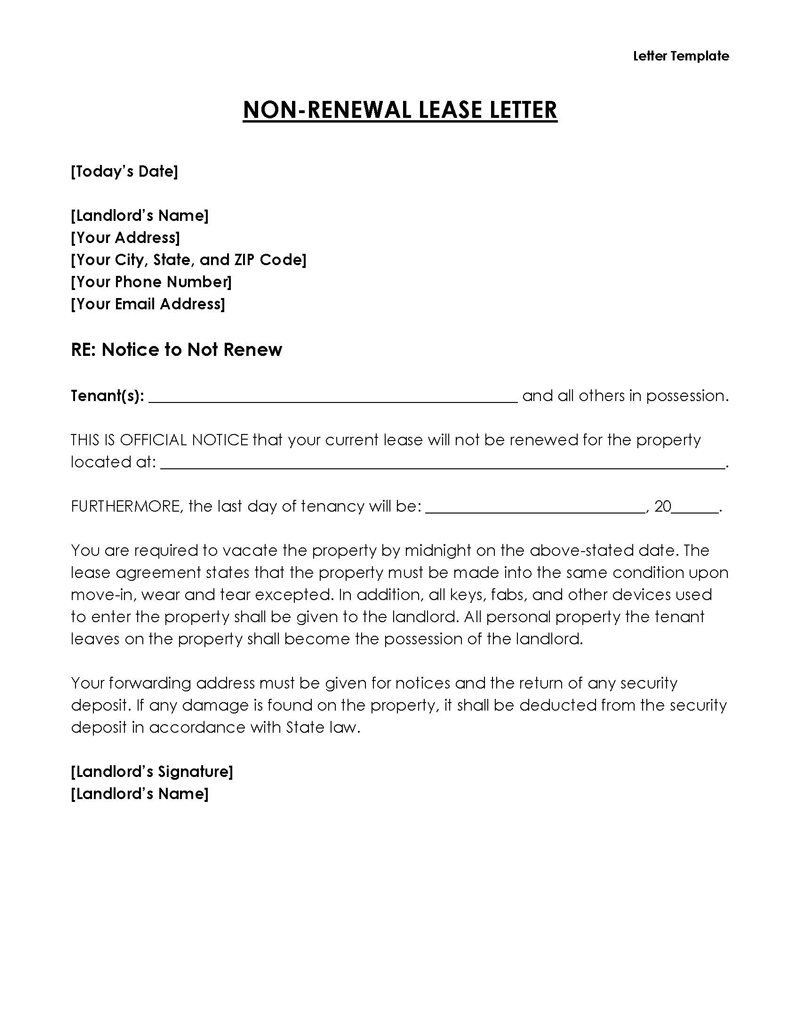
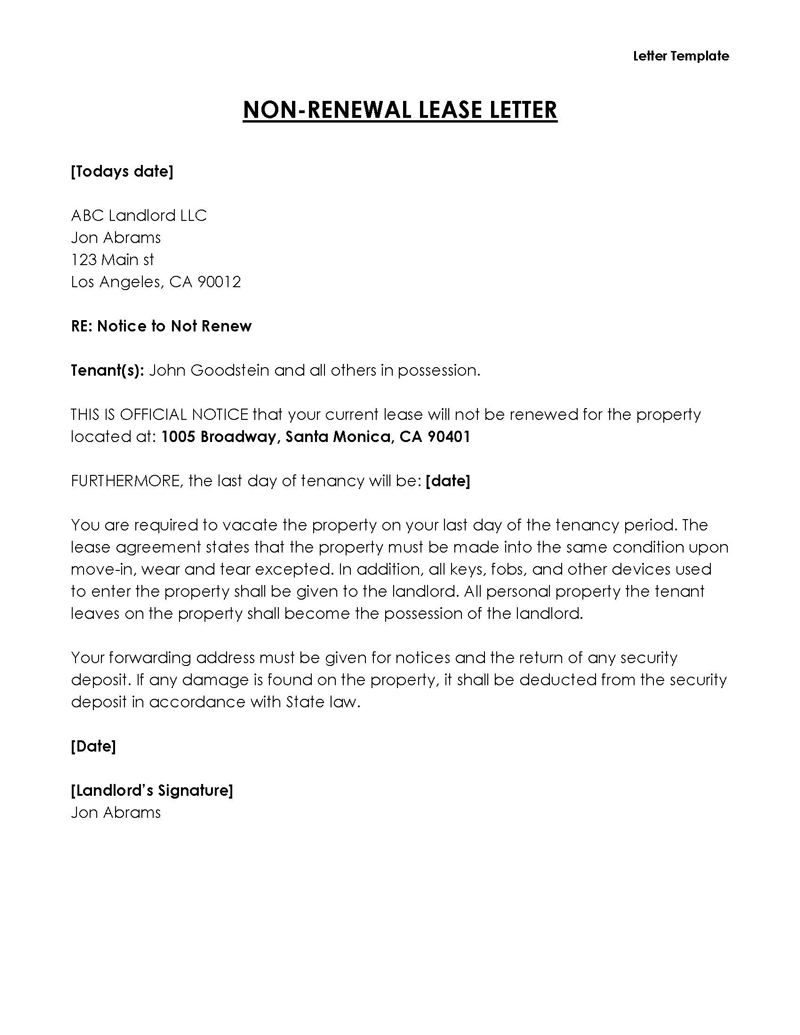
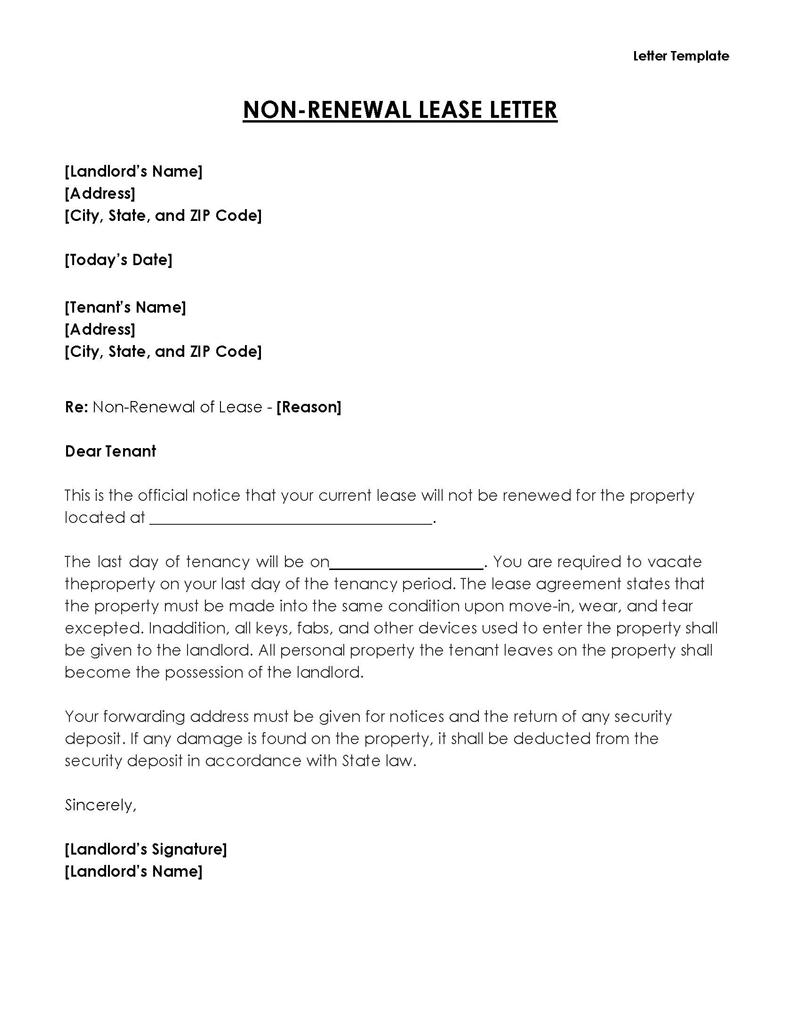
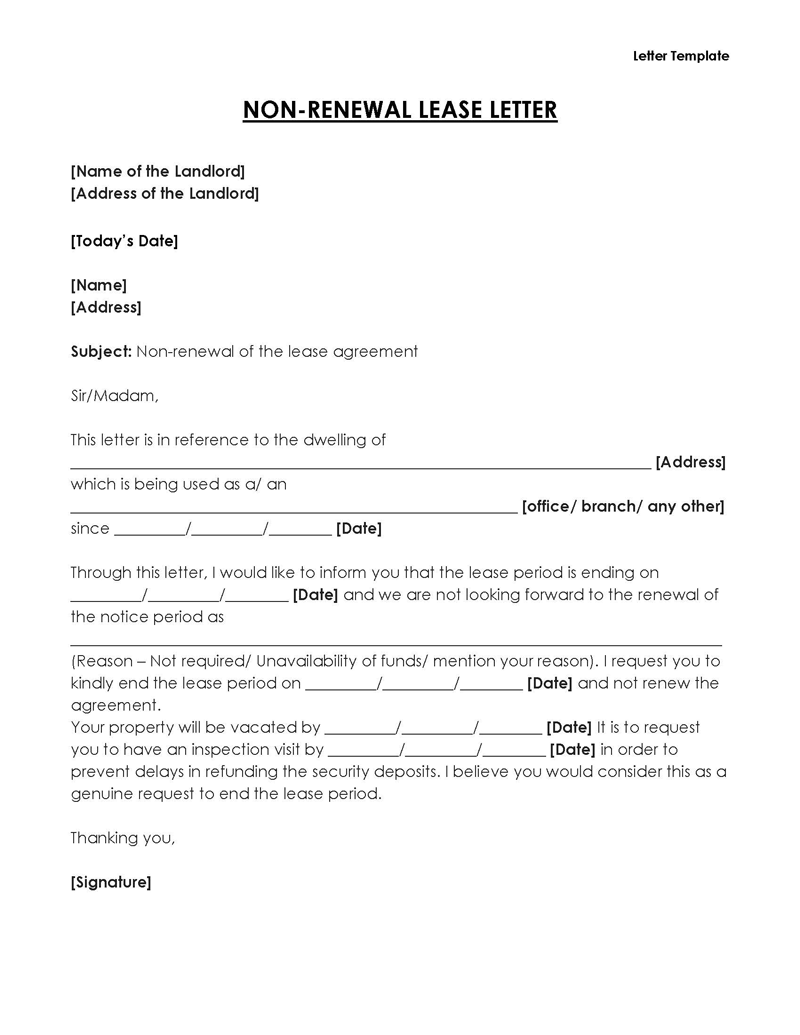
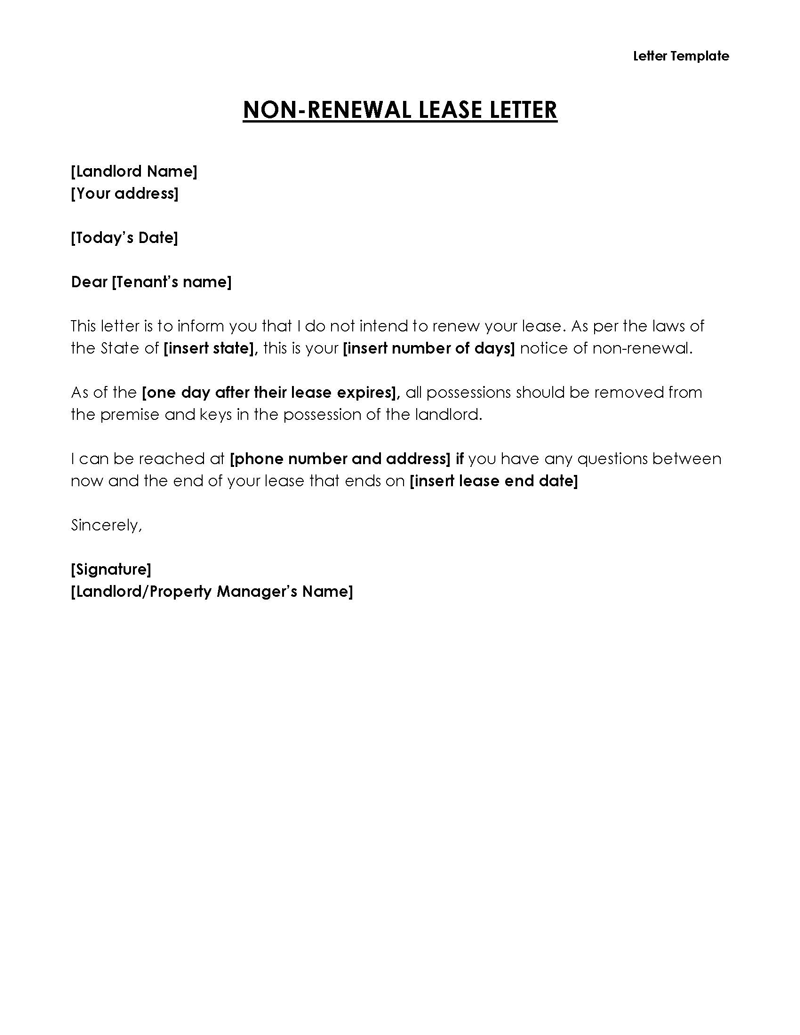
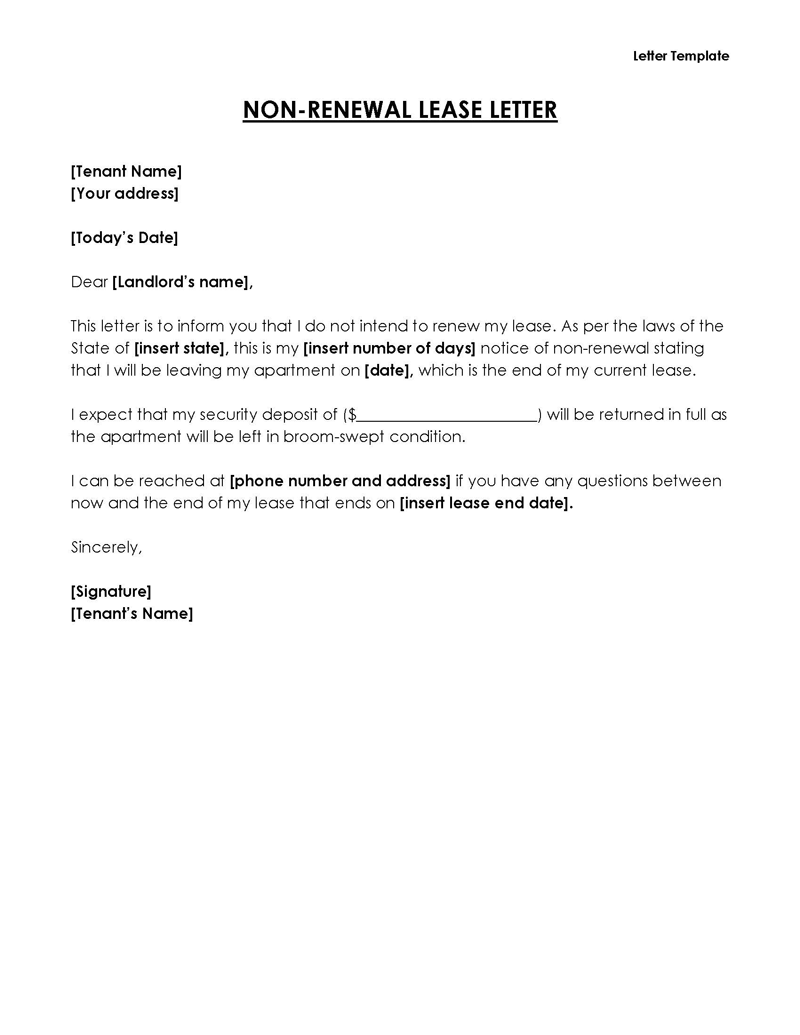
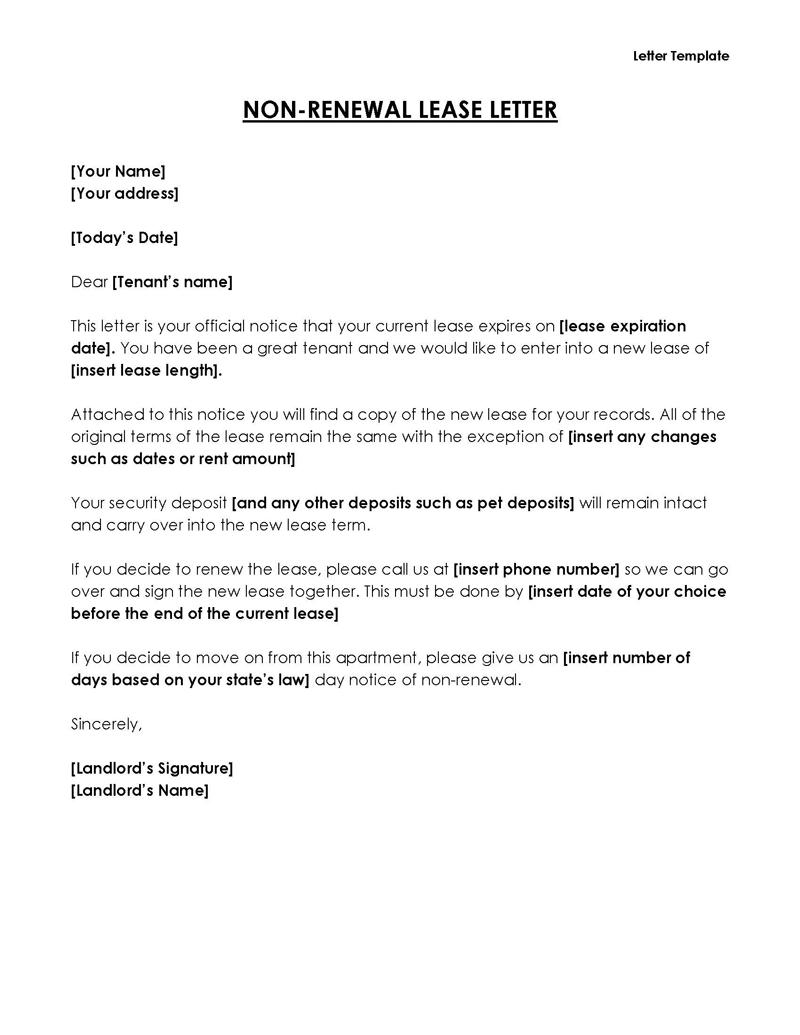
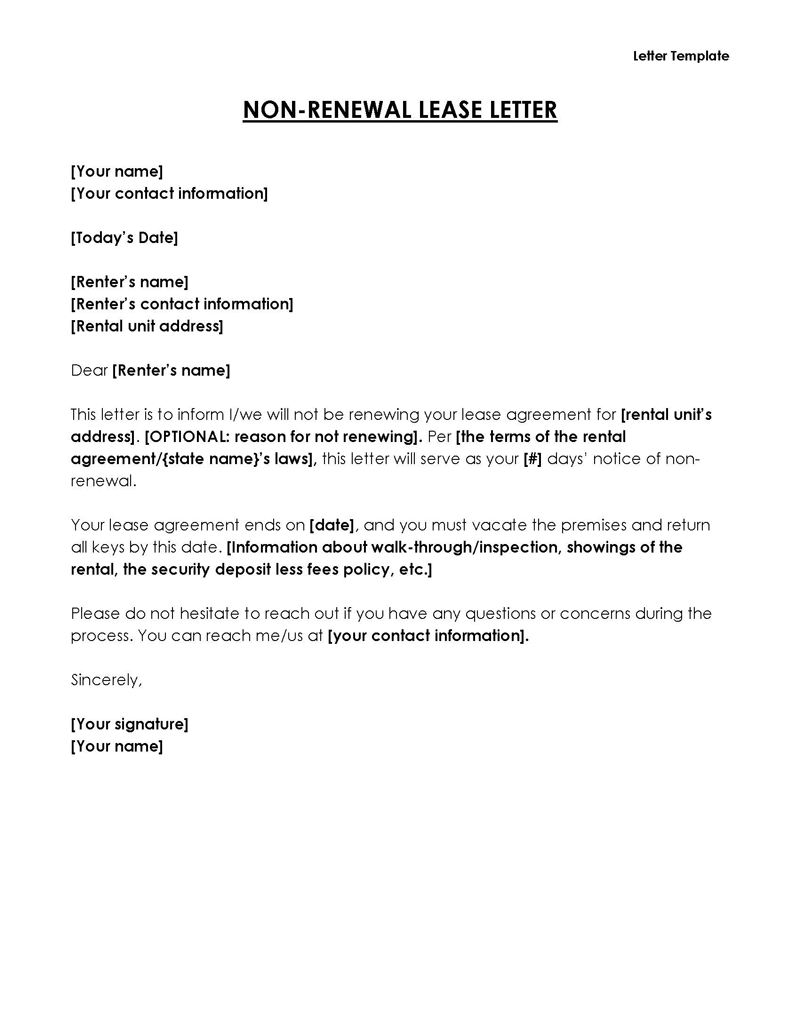
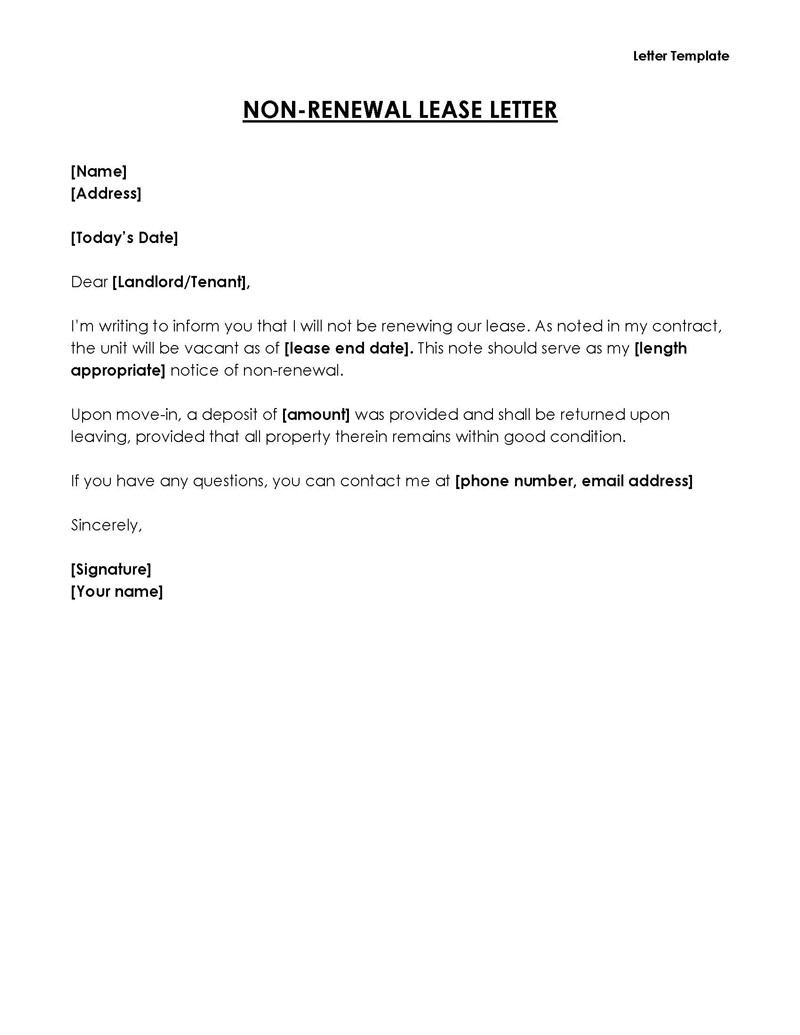
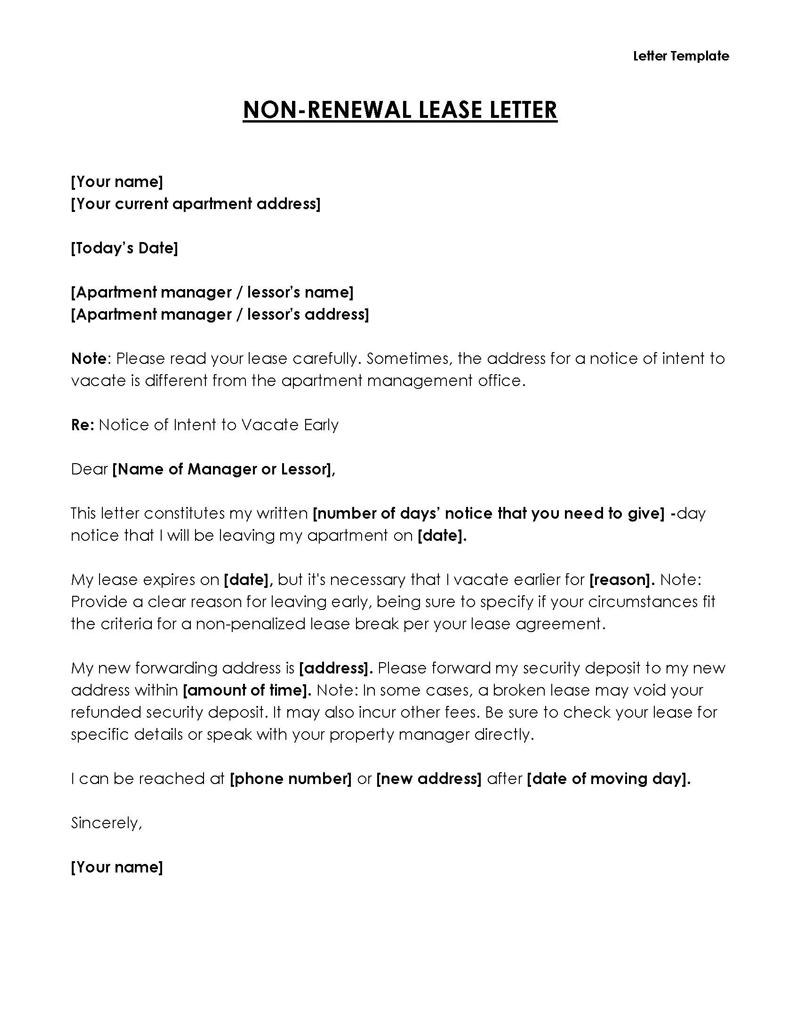
How Many Days’ Notice Should Be Given for Non-Renewal of the Lease?
The amount of notice you should give on the letter of non-renewal will depend on what is allowed by your state and what is listed within the lease. If the lease lists out the amount of notice required, then this is the rule that you should follow.
Tenants and landlords are allowed to give as much additional notice as they wish. A good rule of thumb for writing a non-renewal lease letter is 60 days. This works well for both the tenant and the landlord. The tenant will have enough time to find a new property and move out without having to rush too much, and the landlord will have more time to advertise and find a new tenant to move into the property.
A 30-day notice is typical for many states, though it may change based on whether the lease is month-to-month or a yearly lease. Several states will require no notice for those who are on a yearly or fixed-term lease, including Alabama, Alaska, Arizona, Arkansas, Hawaii, Idaho, and Louisiana. These states will require a 30-day notice for tenants on a month-to-month lease.
Colorado will only require 21 days for a month-to-month lease, while Illinois and Florida will require 30 days for a month-to-month and 60 days for a yearly or fixed-term lease. Connecticut has the shortest, with the month-to-month not having any set rules and the yearly lease requiring only three days.
Final Thoughts
When a landlord or tenant does not wish to renew the lease at any point in the relationship, they can write a lease non-renewal letter to let the other party know of their intentions. This letter must be sent with enough notice to satisfy the lease and state laws. By following the steps explained above, you will be able to write an efficient lease non-renewal letter.





